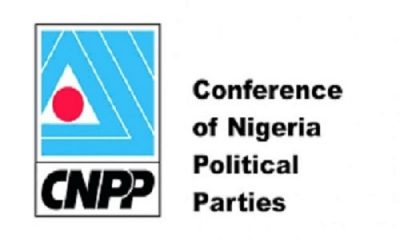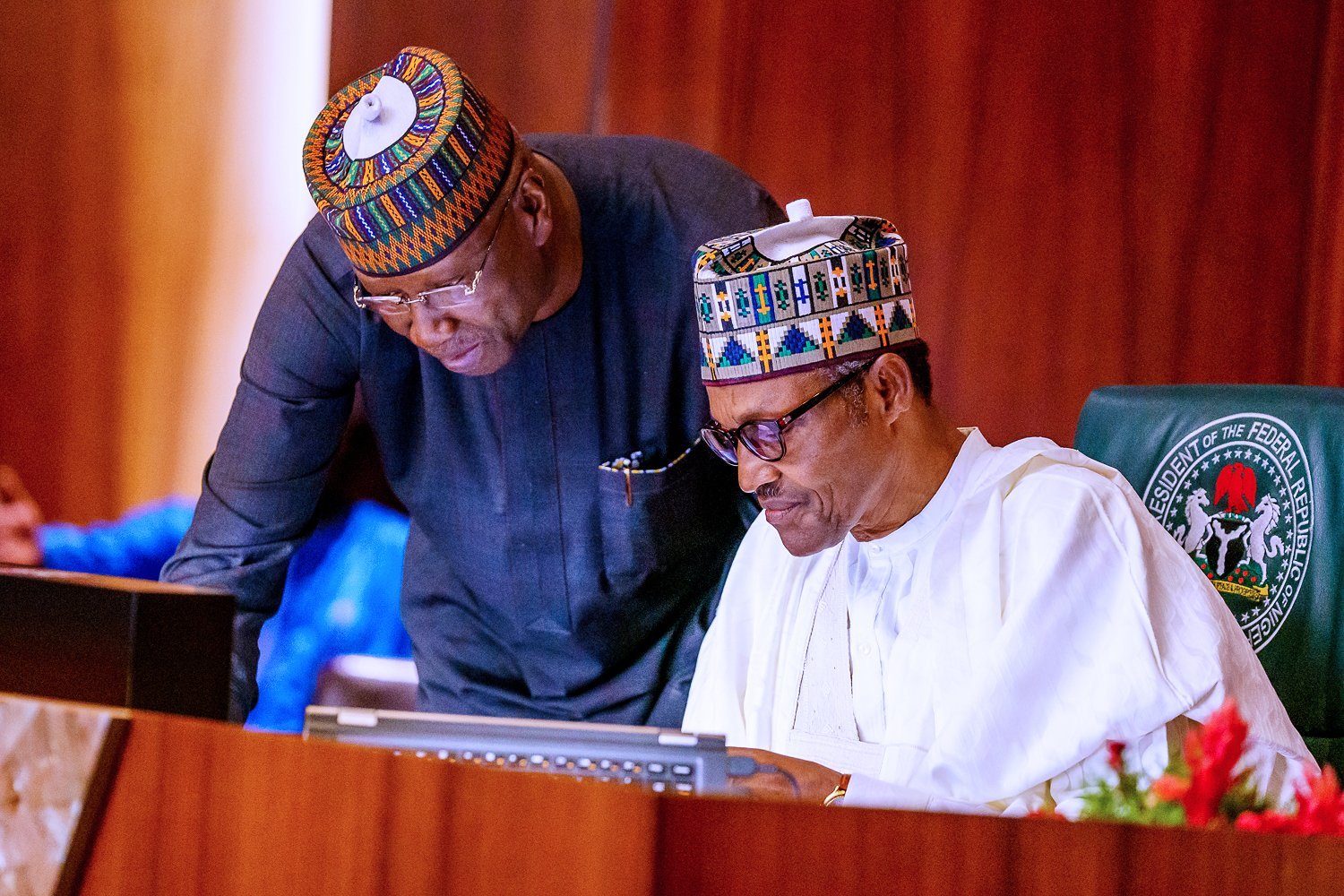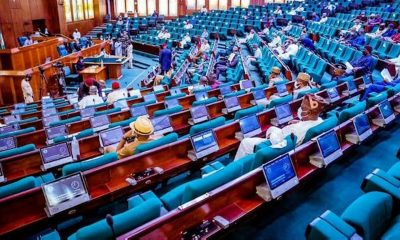Economy
Buhari Seeks NASS Approval To Borrow $30b
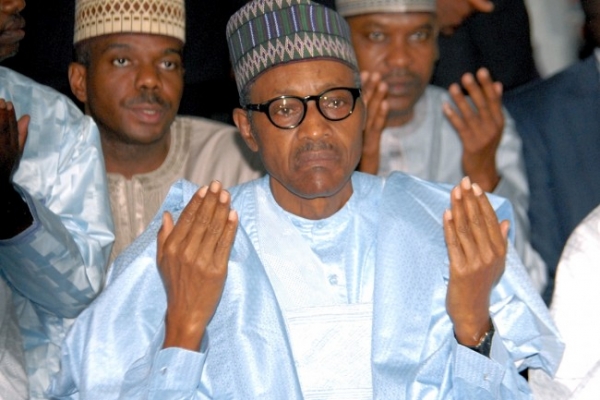
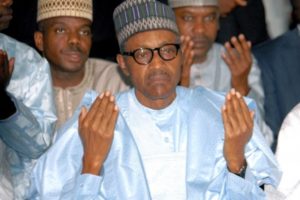
By Ebitonye Akpodigha
President Muhammadu Buhari is looking towards borrowing close to $30 billion to provide infrastructure projects for the benefit of Nigerians.
But to make this possible, he has written to the National Assembly (NASS), seeking its nod to go ahead with his plan.
In the letter presented to House of Representatives, Mr Buhari explained that he hopes to secure an external loan of about $29.960 billion between 2016 and 2018.
“I wish to refer to the above subject and to submit the attached draft of Federal Government 2016-2018 External Borrowing (Rolling) Plan for consideration and early approval by the National Assembly to ensure prompt implementation of the project.
“The project cut across all sectors with special emphasis on Infrastructure, Agriculture, Health, Education, Water Supply, Growth and Employment Generation, Poverty Reduction through Social Safety Net programmes and Governance and Financial Management Reforms among others,” part of the letter read.
He further said, “Considering the huge infrastructure deficit currently being experienced in the country and the enormous financial resources required to fill the gap in the face of dwindling resources and the inability of our annual budgetary provisions to bridge the infrastructural deficit, it has become necessary to resort to prudent external borrowing to bridge the financial gap which will largely be applied to key infrastructure projects namely: power, railway and roads project among others.”
In his analysis, the President explained that, “The total cost of the projects and programmes under the Borrowing (Rolling) Plan is $29.960 billion made up of Proposed Projects and Programmes loan of $11.274 billion Special National Infrastructure Projects $10.686billion Euro Bonds of $4.5 billion and Federal Government Budget Support of $3.5 billion.”
Mr Buhari also explained in the letter that, “I would like to underscore the fact that the projects and programmes in the Borrowing Plan were selected based on positive technical economic evaluations as well as the contribution they would make to the socio-economic development of the country including employment generation and poverty reduction and protection of the most vulnerable and very poor segment of the Nigerian society. The projects and programmes will be implemented in all the 36 states and the Federal Capital Territory.
He further said, “Honourable Members may also wish to know that with the current relative peace and stability in the North East, it has become extremely urgent to start reconstruction and rehabilitation of the region in order to create jobs for the people and rehabilitate the schools to get the children off the streets and into schools. The World Bank has also provided a sum of $450million to assist the FGN in this reconstruction and rehabilitation efforts.
“The recent outbreak of polio in the North East is a matter of concern, especially following the recent delisting of Nigeria from the list of polio endemic countries. This therefore calls for urgent and immediate action to stem the tide of the outbreak.
“The World Bank has approved a loan in the sum of $125 million to the FGN to procure vaccines and other ancillary to stop and eventually eliminate the outbreak.
“$125 million for Polio Eradication Support and routine immunization Project, $75 million for Community and Social Development Project, $125 million for Nigeria States Health Programme Investment Project $100 million for State Education Programme Investment Project, another $100million for Nigeria Youth Employment and Social Support Project, and $150 million for Fadama III Project.”
Meanwhile, Speaker of the House of Representatives, Mr Yakubu Dogara, who read the President’s letter on Monday, noted that the issue would be discussed in the House before the end of the week.
Economy
LIRS Urges Taxpayers to File Annual Returns Ahead of Deadline

By Modupe Gbadeyanka
All individual taxpayers in Lagos State have been advised to file their annual tax returns ahead of the March 31 deadline.
This appeal was made by the Lagos State Internal Revenue Service (LIRS) in a statement issued by its Head of Corporate Communications, Mrs Monsurat Amasa-Oyelude.
The notice quoted the chairman of LIRS, Mr Ayodele Subair, as saying that timely filing remains both a constitutional and statutory obligation as well as a civic responsibility.
The statutory filing requirement applies to all taxable persons, including self-employed individuals, business owners, professionals, persons in the informal sector, and employees under the Pay-As-You-Earn (PAYE) scheme.
In accordance with Section 24(f) of the 1999 Constitution of the Federal Republic of Nigeria, Sections 13 &14(3) of the Nigeria Tax Administration Act 2025 (NTAA), every individual with taxable income is required to submit a true and correct return of total income from all sources for the preceding year (January 1 to December 31, 2025) within 90 days of the commencement of a new assessment year.
“Filing of annual tax returns is not optional. It is a legal requirement under the Nigeria Tax Administration Act 2025. We encourage all Lagos residents earning taxable income to file early and accurately.
“Early and accurate filing not only ensures full adherence with statutory requirements, but supports effective monitoring and forecasting, which are critical to Lagos State’s fiscal planning and long-term sustainability,” Mr Subair stated.
He further noted that failure to file returns by the statutory deadline attracts administrative penalties, interest, and other enforcement measures as prescribed by law.
To enhance convenience and efficiency, all individual tax returns must be submitted electronically via the LIRS eTax portal at https://etax.lirs.net. The platform enables taxpayers to register, file returns, upload supporting documents, and manage their tax profiles securely from anywhere.
In keeping with global best practices, Mr Subair reiterated that LIRS continues to prioritise digital tax administration and taxpayer support services. He affirmed that the LIRS eTax platform is secure and accessible worldwide. Taxpayers requiring assistance may visit any of the LIRS offices or other channels.
Economy
NNPC Targets 230% LPG Supply Surge to 5MTPA Under Gas Master Plan 2026

By Adedapo Adesanya
The Nigerian National Petroleum Company (NNPC) Limited has said the Gas Master Plan 2026 targets over 230 per cent scale-up of Liquefied Petroleum Gas (LPG) supply from 1.5 million tonnes per annum (MTPA) to 5 MTPA this year.
The Executive Vice President for Gas, Power and New Energy at NNPC, Mr Olalekan Ogunleye, unveiled the strategic direction of the NNPC Gas Master Plan 2026, outlining an aggressive expansion drive to position Nigeria as a regional and global gas powerhouse.
Mr Ogunleye delivered the keynote address at the 2026 Lagos Energy Week, organised by the Society of Petroleum Engineers (SPE), where he detailed plans to accelerate gas development, deepen infrastructure and significantly scale domestic supply.
According to him, the Gas Master Plan targets a scale-up of LPG or cooking gas supply from 1.5 MTPA to 5 MTPA, alongside expanded feedstock for Mini-LNG and Compressed Natural Gas (CNG) projects.
“The NNPC Gas Master Plan 2026 is a blueprint to unlock Nigeria’s vast gas potential and translate it into tangible economic value,” Mr Ogunleye said.
He added that the strategy would also drive exponential growth in Gas-Based Industries, GBIs, strengthening local manufacturing, fertiliser production and power generation.
“Our renewed focus is on turning abundant gas resources into inclusive economic growth and improved quality of life for Nigerians,” he stated.
Mr Ogunleye said the plan aligns with the Federal Government’s Decade of Gas initiative and the presidential production targets of achieving 10 billion cubic feet per day by 2027 and 12 BCF/D by 2030.
Industry leaders at the event, including executives from Chevron Corporation, Esso Exploration and Production Nigeria Limited, Midwestern Oil and Gas Company Limited, Abuja Gas Processing Company and Shell Nigeria Gas, commended the plan and praised Ogunleye’s leadership in driving implementation excellence.
The new blueprint signals NNPC’s determination to anchor Nigeria’s energy transition on gas, leveraging infrastructure expansion and domestic utilisation to consolidate the country’s status as Africa’s largest gas reserve holder.
Economy
Shettima Blames CBN’s FX Intervention for Naira Depreciation

By Adedapo Adesanya
Vice President Kashim Shettima has attributed the Naira’s recent depreciation to the intervention of the Central Bank of Nigeria (CBN) in the foreign exchange (FX) market, stating that the currency could have strengthened to around N1,000 per Dollar within weeks if the apex bank had allowed market forces to prevail.
The local currency has dropped over N8.37 on the Dollar in the last week, as it closed at N1,355.37/$1 on Tuesday at the Nigerian Autonomous Foreign Exchange Market (NAFEM), after it went on a spree late last month and into the early weeks of February.
However, speaking on Tuesday at the Progressive Governors’ Forum (PGF), Renewed Hope Ambassadors Strategic Summit in Abuja, the Nigerian VP said the intervention was to ensure stability.
“In fact, if not for the interventions by the Central Bank of Nigeria yesterday, the 1,000 Naira to a Dollar we are going to attain in weeks, not in months. But for the purpose of market stability, the CBN generously intervened yesterday.
“So, for some of my friends, especially one of our party leaders who takes delight in stockpiling dollars, it is a wake-up call,” the vice president said.
He was alluding to CBN buying US Dollars from the market to slow down the rapid rise of the Naira.
Latest information showed that last week, the apex bank bought about $189.80 million to reduce excess Dollar supply and control how fast the Naira was gaining value.
The move was aimed at preventing foreign portfolio investors from exiting Nigeria’s fixed-income market, as large-scale sell-offs could heighten demand for US Dollars, intensify capital flight, and exert further pressure on the exchange rate.
Amid this, speaking after the 304th meeting of the monetary policy committee (MPC) of the CBN on Tuesday, Governor of the central bank, Mr Yemi Cardoso, said Nigeria’s gross external reserves have risen to $50.45 billion, the highest level in 13 years.
This strengthens the country’s foreign exchange buffers, enhances the apex bank’s capacity to defend the Naira when needed, and boosts investor confidence in the stability of the Nigerian FX market.
-

 Feature/OPED6 years ago
Feature/OPED6 years agoDavos was Different this year
-
Travel/Tourism10 years ago
Lagos Seals Western Lodge Hotel In Ikorodu
-

 Showbiz3 years ago
Showbiz3 years agoEstranged Lover Releases Videos of Empress Njamah Bathing
-

 Banking8 years ago
Banking8 years agoSort Codes of GTBank Branches in Nigeria
-

 Economy3 years ago
Economy3 years agoSubsidy Removal: CNG at N130 Per Litre Cheaper Than Petrol—IPMAN
-

 Banking3 years ago
Banking3 years agoSort Codes of UBA Branches in Nigeria
-

 Banking3 years ago
Banking3 years agoFirst Bank Announces Planned Downtime
-

 Sports3 years ago
Sports3 years agoHighest Paid Nigerian Footballer – How Much Do Nigerian Footballers Earn


